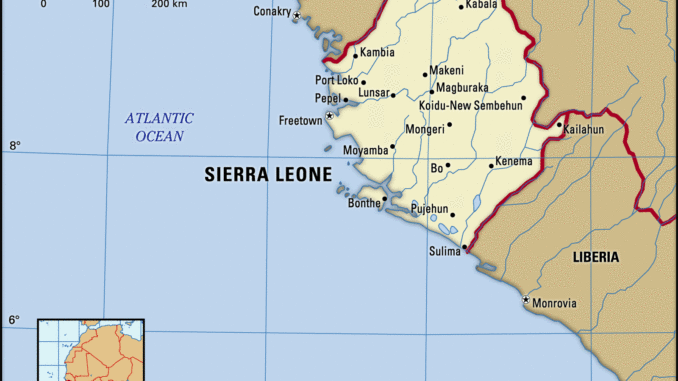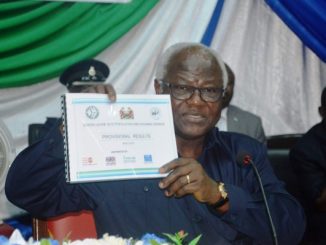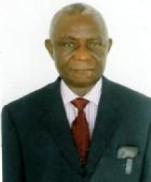
By Sylvanus Fornah Koroma
Nearly two months have passed since the conduct of the June 24, 2023, multi-tier elections in Sierra Leone, yet the publishing of the elections results remain pending. This delay in adhering to the legal requirement outlined in ‘section 93 of the Public Elections Act 2022,’ which mandates the Electoral Commission of Sierra Leone (ECSL) to promptly publish the results, goes beyond merely raising suspicions of foul play. It possesses the potential to ignite a significant crisis in post conflict Sierra Leone, where demonstrations and protests have already gained momentum among Sierra Leoneans living in the diaspora.
If the pleas from Sierra Leoneans abroad for the ECSL to transparently disclose and publish the aforementioned multi-tier elections results are not met with the gravity they warrant, the ECSL’s management will not only be perceived as incompetent and ineffective, as is currently the case, but could also metamorphose into a volatile ingredient for turmoil within our cherished Sierra Leone. The million-dollar question remains: why is ECSL so adamant and refusing to publish the elections results and it is knowingly toying with a dangerous recipe for trouble in our sweet Mama Salone?
The All Peoples Congress (APC) firmly maintains that they emerged victorious in the June 24, 2023, multi-tier elections in a fair and transparent manner. Furthermore, the APC alleges that the ECSL has engaged in a plot to unjustly strip the Party of its rightful victory and bestow it upon an undeserving Party. This narrative has been brought to light by the public statement made by the National Chairman of the Sierra Leone People’s Party (SLPP). In his statement, he did not only declare that the SLPP will never hand over power to the APC but also employed derogatory language, labelling the APC as “fools.” The use of such disrespectful language towards the APC is yielding severe consequences.
Beyond the immediate implications, this statement has also dealt a blow to the ECSL’s
credibility in terms of its results declaration. In fact, these remarks have cast a shadow of doubt upon the legitimacy of the ECSL’s officially announced and declared elections results more so when to date ECSL has not been able to publish the elections results as provided by ‘law,’ particularly section 93 and section 52 paragraph (b) of the Public Elections Act 2022. This situation is both concerning and complex, shedding light on the need for a thorough investigation and transparent discourse.
Among the key issues discussed by Sierra Leoneans in and out of Sierra Leone on the country’s
political impasse that ECSL has caused is the issue of having a ‘transitional government.’
A transitional government, especially in a situation where elections results are disputed, is an interim administration established to manage the country during a period of political uncertainty or turmoil. This type of government is put in place when there are significant challenges or controversies surrounding the elections processes, such as allegation of fraud, irregularities, or lack of consensus on the legitimacy of the election outcomes. The primary goal of transition government is to provide stability, ensure a peaceful resolution to the political crisis, and create a conducive environment for fair and credible elections to be held in the future. In the case of Sierra Leone, where elections results are disputed, a transitional government would involve representatives from the judiciary, various political parties, religious bodies, civil societies, and possibly international organizations. The key functions of a transitional government in this scenario would include:
- Neutral Leadership: The transitional government would be led by individuals who are seen
as impartial and capable of overseeing the administration without favouring any political
party. These leaders would work to bridge the gap between rival factions and restore public
trust. The APC as a party will kick against any SLPP person to be in charge and to provide that
leadership to the transition, just as the SLPP will also be averse to the idea to have the APC to
provide such leadership. The wisdom for such kind of action is in the popular Latin phrase
“Nemo judex in causa sua,” which translates to “No one is a judge in their own case.” In
other words, it means that a person should not be the judge in a situation where they are
also a party involved. - Legal and Institutional Reforms: The transitional government might work on reforming
electoral laws, strengthening electoral institutions, and addressing any issues that led to the
disputed elections results. This could involve reviewing and amending electoral regulations
to enhance transparency, fairness, and accountability. The underlined in the sentence above
is very key! I have been a very strong advocate for A Call for Ethnic Audit in Sierra Leone. In
short, there is now the need to have this legislated: No one tribe or ethnic group shall have
more than one-third of employees in any workplace be it a public or private sector. The
rationale behind such legislation in a polarized nation could be to promote inclusivity,
diversity, and equitable representation within the workforce. By limiting the dominance of
any one tribe or ethnic group in employment, the goal might be to create a more balanced
and harmonious work environment. This could help reduce tensions and competition among
different groups, leading to a more inclusive and cohesive society. The intention might also
be to address historical inequalities and ensure that opportunities are available to individuals
from all backgrounds. However, it is worth noting that such legislation could also raise
concerns about fairness, individual merit, and unintended consequences. - National Dialogue: The transitional government would facilitate a national dialogue where
all stakeholders, including political parties, civil society organizations, and citizens, can
engage in open discussions to resolve grievances, share perspectives, and build consensus on
the way forward. - Reconciliation: A critical perspective of a transitional government is promoting reconciliation
among different factions within the country. This could involve initiatives aimed at healing
divisions, addressing historical grievances, and fostering an inclusive political environment.
Thus, the legislation on ‘No one tribe or ethnic group shall have more than one-third of
employees in any workplace be it a public or private sector,’ comes in handy. - Preparation for New Elections: The transitional government would work towards organizing
new elections that are widely accepted as fair and transparent. Not an elections wherein for
example SLPP will be announced to have 22,000 votes casts in the Port Loko district and ECSL
allocates 4 Members of Parliament to SLPP in Port Loko; but ECSL will not allocate any seat to
the APC in Bo District to get representation in Parliament even when the APC has similar
number of votes casts in Bo District, and Bo District also has similar electorate number as the
electorates in Port Loko. What an unfair ECSL practice. In any case, new elections will change
the ugly and unfair face of ECSL. Furthermore, this might involve collaborating with
international organizations to ensure international oversight and assistance in the elections
processes and also ensure transparency and fairness are maintained to meet international
standards in the conduct of the elections. Certainly, there would be financial challenges on
how to raise monies for this purpose. But if the monies are with an assurance that the said
monies will be effectively and efficiently allocated, spent, and monitored, Sierra Leone will
become a model for other African states and even the world at large to emulate its
unprecedented determination to bring sanity in elections in this decade and beyond. A real
bio-metric registration and voting will be put in place. - International Mediation: In some cases, international actors such as regional organizations
or the United Nations may be involved in facilitating and mediating the transition process to
ensure neutrality and legitimacy. International mediation can assist in the generation of the
required funding to ensure that fair and transparent elections are conducted in accordance
with the laws of Sierra Leone.
Overall, a transitional government’s success depends on the willingness of all parties
involved to engage in constructive dialogue, compromise, and the establishment of a shared
vision for the country’s future. It serves as a temporal solution to a political crisis, with the
ultimate goal of paving the way for stable governance and credible elections.
Another critical concern regarding the transparent discourse revolves around the unsettling fact that the ECSL has allowed two months to elapse since the conclusion of the June 24th multi-tier elections, during which time the announced results have been openly contested. However, in defiance of legal requirements, ECSL has chosen not to release the results to the public. This inaction on the part of ECSL has ignited suspicions and cast doubt on the credibility of the results they have declared. Many voices are now openly critical of ECSL’s actions, and a prevailing sentiment is that their failure to publish the elections results aligns with an intention to endorse the brash political rhetoric of individuals such as Dr Prince Harding, the National Chairman of the Sierra Leone People’s Party (SLPP). Dr Prince Harding’s Statement, asserting that the SLPP will never relinquish or hand over power to the APC again, resonates as a blatant affront to his opponents.
This formally accredited yet educationally deficient figure has not retracted his audacious remarks, which undeniably disrespected the APC in the presence of his own party’s leadership. Astonishingly, rather than reprimand him for such inflammatory language, the SLPP Leader rewarded both Dr Prince Harding and his spouse with prominent government roles, signalling an alarming endorsement of his derogatory stance towards the APC and international observers. Adding to the affront, the accredited but inadequately educated SLPP National Chairman, Dr Prince Harding, had
the audacity to extend an invitation to the APC to collaborate under the leadership of the SLPP. This brazen move speaks volumes.
Dr Prince Harding, the very individual who once championed the call for the resignation of former Inspector General of Police, Mr. Munu, for similar remarks against the SLPP, now finds himself shielded by his own party’s leadership. This stark hypocrisy reveals a disconcerting arrogance, implying that the SLPP holds itself above scrutiny while expecting public acquiescence. However, it is high time that the SLPP comprehends that the people of Sierra Leone refuse to conform to their skewed perceptions. We are not timid; we are resolute in speaking out.
The recurring manifestation of this haughty attitude in the SLPP’s leadership is emblematic of their governance over the past five years, where double standards prevail. Nonetheless, this time we are resolute in upholding accuracy and adherence to regulations. So long as Dr Prince Harding, a credentialed yet uneducated individual, continues to occupy positions both within the party and the government, it is undeniable that the APC will remain convinced that his injudicious pronouncements enjoy the endorsement of the SLPP and its leadership.
A transparent discourse on the issue of the current political impasse that has been orchestrated by ECSL and its allies has a lot for one to be mindful of. Certainly, the delayed publication of the results of the elections of June 24, 2023, that has now taken two (2) months since the elections were held is a clear manifestation of the incompetence of the ECSL. Further to the delay, the management of ECSL publicly said that the law does not mandate them to publish the results, and this again is a showcase of gross incompetence and lack of understanding of the document (Bill) they (ECSL) largely contributed to make into law known as the Public Elections Act 2022 (PEA 2022). For the edification of us all and particularly the ECSL who certainly do not understand the PEA 2022, allow me to provide you simple analysis of the relevant sections of the PEA 2022 and their implications for the legitimacy of the elections results, particularly in the context of delayed publication and a potential challenge to the elections’ validity that may further widen the impasse to an unpredictable outcome.
- Section 51: This section outlines the process of counting and certifying votes, starting at
the polling station level, and progressing to the National Returning Officer. It emphasizes
the need for accurate certification and transmission of results. - Section 52: After declaring the result of a presidential election, the National Returning
Officer is responsible for issuing a certificate of election to the successful candidate and
publishing the result in the Gazette and through other means. - Section 92: This section describes the process of compiling results at different levels
(district, regional) and transmitting certified copies to the higher authorities, ultimately
culminating in the National Returning Officer tallying, and computing the results. - Section 93: Following the National Returning Officer’s declaration of results, the Electoral
Commission is mandated to publish the results of both the presidential and
parliamentary elections. - Section 54: This section allows citizens to challenge the validity of a presidential election
through a petition to the Supreme Court within 7 days after the declaration of results. A
declaration by the Supreme Court that the election is not valid does not affect actions
taken by the President before the declaration.
The current situation in Sierra Leone where there has been a deliberate delay in publishing the
results of the multi-tier elections of June 24, 2023, has raised concerns about the legitimacy of the
President announced and the numbers of seats announced for the political parties. So, it is important to note the following:
- The provisions in the PEA 2022 are designed to ensure transparency, accuracy, and fairness in
the electoral process. ECSL so far has acted contrary to the spirit and provisions in the Act.
• Delay in publishing results has raised concerns about transparency and could potentially lead
to challenges to the legitimacy of the announced President, especially when domestic and
international observers have raised objections.
• The ability to challenge the election’s validity of the presidential election within seven (7)
days provides a legal avenue for addressing potential issues with the election process. ECSL
has compromised its function and failed to fulfil its duties in accordance with the Act. A delay
of two (2) months in publishing results has raised significant questions about the credibility
and legitimacy of the elections, especially in this polarized context which has led to increased
skepticism and doubts about the electoral process.
• The Act aims to balance the need for a timely transition of power with the need for a fair and
legitimate election outcome.
It is evident that the ECSL is aligned with the leadership of the SLPP. Equally apparent is the
calculated strategy of both the ECSL and SLPP, who seem to believe that by announcing what a
significant of respondents in my Gallup poll have aptly termed ‘ECSL’s imaginative results,’ the people
of Sierra Leone will simply acquiesce. It appears they are banking on either leveraging moral
influencers to sway the APC and the public into acceptance, or as last resort, pursuing a favourable judicial ruling. However, Sierra Leoneans are resolute in their determination to put an end to this farce and rectify this abuse of the democratic process promptly, rather than enduring another five[1]year cycle. The ongoing political deadlock is an unmistakable signal that Sierra Leoneans are no longer willing to tolerate the perpetuation of political manipulation, particularly when it is untimely.
We must recognize that over the past five years, Sierra Leoneans have patiently awaited the
opportunity to express their preferences through the ballot, and they will not permit their votes to be compromised by anyone, especially the faltering ECSL. It is evident that the ECSL’s capacity and
credibility to deliver accurate results have eroded. Consequently, Sierra Leoneans are now
advocating for the establishment of a transitional or interim government to facilitate a legitimate election or re-election at the earliest juncture, one that encompasses the entirety of the multi-tier electoral process, not just a presidential runoff.
Electoral outcomes are meant to be determined by the votes of the citizenry, free from the influence of the Electoral Commission’s aspirations or suppositions. The current electoral crisis demands a national dialogue. This discussion holds the potential to temper the prevailing political impasse and alleviate the escalating tensions that have arisen from the June 24th elections, now labelled as ‘Rigged Elections.’ The notion of rigged elections is categorically unacceptable. As echoed by Mr. Julius Maada Bio, the National Leader of the SLPP, ‘Rigged elections will lead to war.’ Given the global and regional conflicts we witness, Sierra Leoneans are steadfastly averse to revisiting a war-torn past.
However, while we unequivocally reject the prospect of war, we will not abide by any imposition by the ECSL or any other entity that sanctions rigged elections in any guise. The elections must be transparent and legitimate, or they will not be embraced. Therefore, it is incumbent upon us to convene a national dialogue that resets the course and expedites the planning of a fresh multi-tier election at the earliest feasible opportunity.




